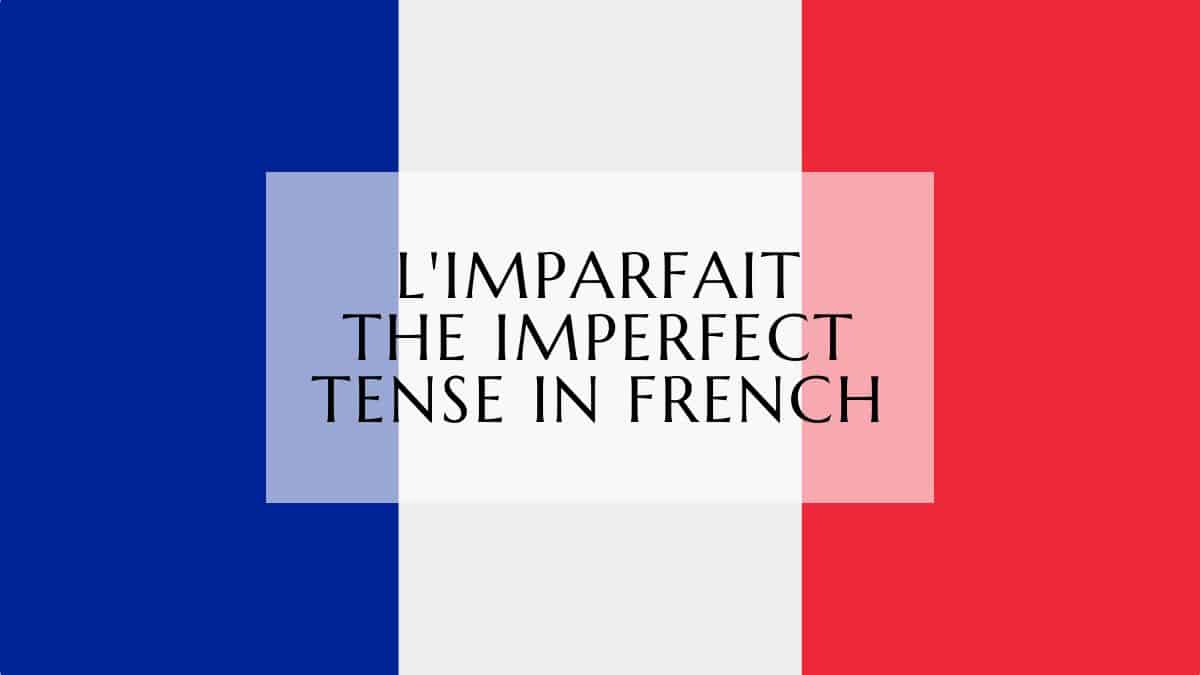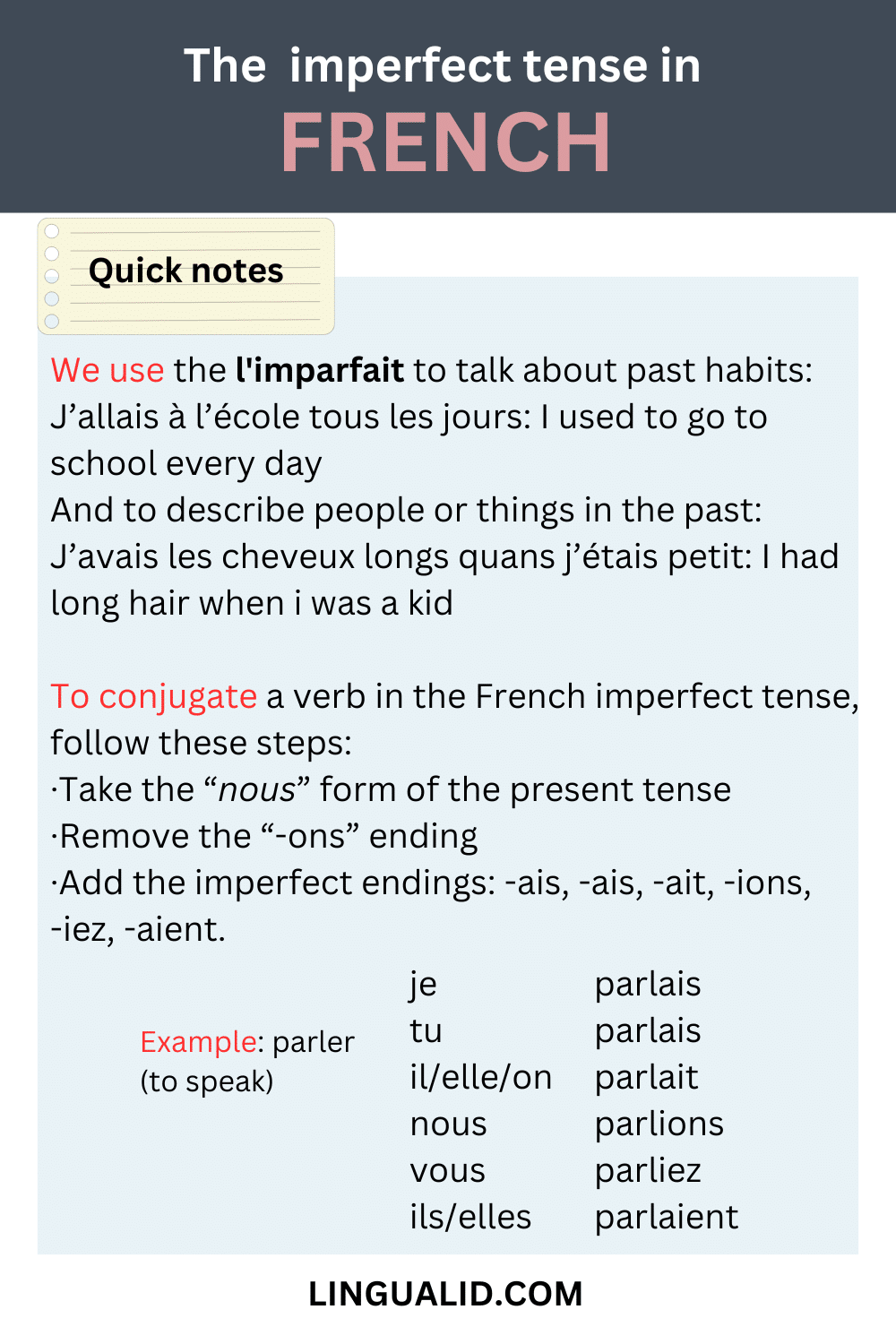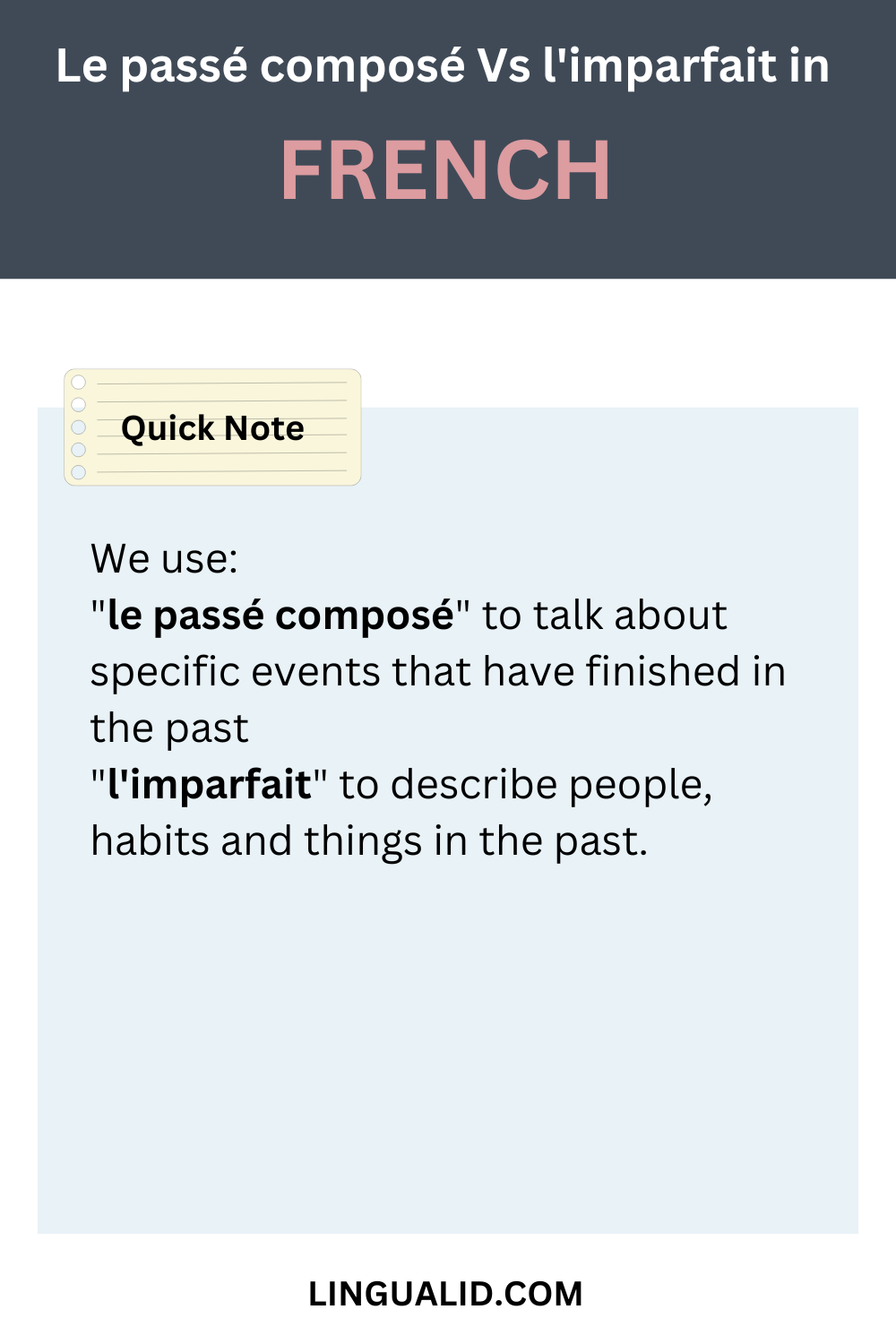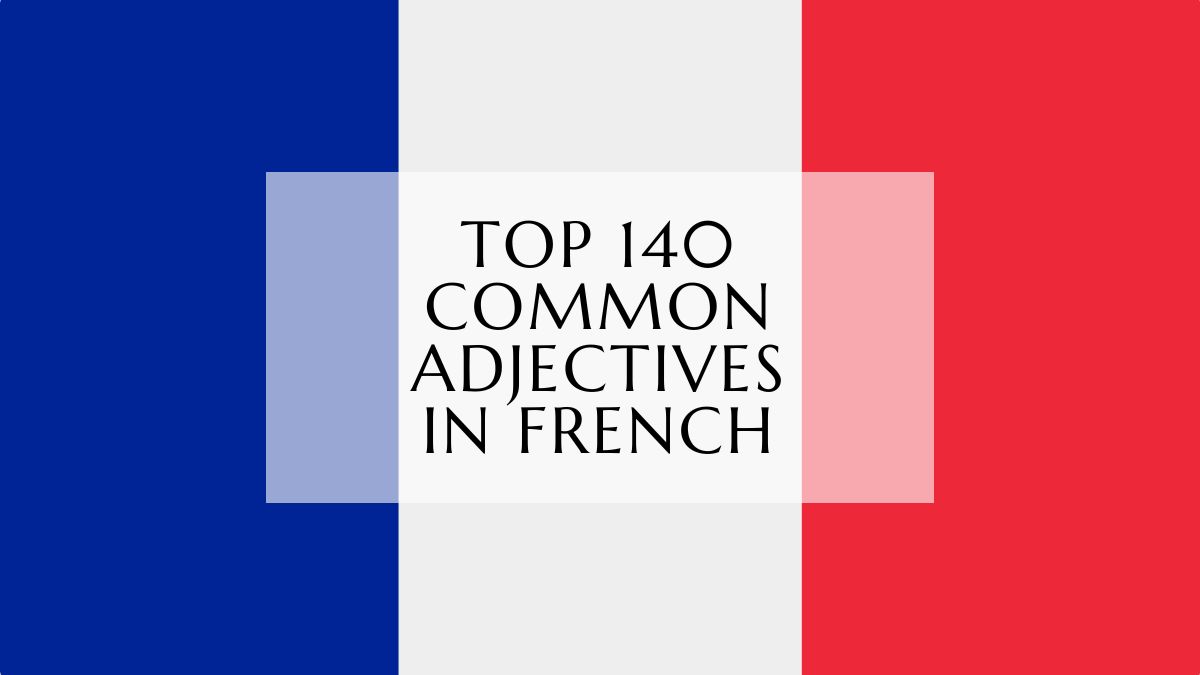The imperfect tense in French (l’imparfait) is one of the two past tenses in French, and it is used to talk about past habits that was usual in a period of time in the past, and to describe people, things or places in the past.
In this lesson, we will talk about the use and difference between the Imperfect Tense (l’imparfait) and the Passé composé, and the conjugation of each verb type (-er, -ir and -re) then give some examples.

The Imperfect Tense In French
We use l’imparfait to talk about past habits:
J’allais à l’école tous les jours: I used to go to school every day
And to describe people or things in the past:
J’avais les cheveux longs quand j’étais petit: I had long hair when i was a kid
To conjugate a verb in the French imperfect tense l’imparfait, follow these steps:
- Take the “nous” form of the present tense
- Remove the “-ons” ending
- Add the imperfect endings: -ais, -ais, -ait, -ions, -iez, -aient.
The endings are:
| Subject | Ending |
| je | ais |
| tu | ais |
| il/elle/on | ait |
| nous | ions |
| vous | iez |
| ils/elles | aient |
Conjugating -er verbs in the imperfect
Let’s take the verb Parler (to speak) for example, in the present tense it is nous parlons, remove the ons, you get parl, now add the endings and voilà:
| je | parlais |
| tu | parlais |
| il/elle/on | parlait |
| nous | parlions |
| vous | parliez |
| ils/elles | parlaient |
Verbs ending with -ier, étudier for example:
This may look weird but, -ier verbs keep both two i in both nous and vous:
| je | étudiais |
| tu | étudiais |
| il/elle/on | étudiait |
| nous | étudiions |
| vous | étudiiez |
| ils/elles | étudiaient |
Note: you can practice what you’ve learned here, and learn how to pronounce each of the words in our Memrise course here, don’t know how to use the platform or sign up? we’ve got you covered in this easy-to-follow tutorial here.
Conjugating -ir verbs in the imperfect
Example: Finir (to finish)
| je | finissais |
| tu | finissais |
| il/elle/on | finissait |
| nous | finissions |
| vous | finissiez |
| ils/elles | finissaient |
Conjugating -re verbs in the imperfect
Example: Apprendre (to learn)
| je | apprenais |
| tu | apprenais |
| il/elle/on | apprenait |
| nous | apprenions |
| vous | appreniez |
| ils/elles | apprenaient |
Conjugating the verb être in the imperfect
| j’ | étais |
| tu | étais |
| il/elle/on | était |
| nous | étions |
| vous | étiez |
| ils/elles | étaient |

Some Exceptions
Luckily there are only a few exceptions to take care of, like the verbs ending in –cer or –ger, these verbs follow the same rule as –er verbs, however we need to make some little changes to maintain the pronunciation.
Verbs ending in –cer have a cedilla in the c, and it remains in all the pronouns in the imperfect except for nous and vous.
Example: commencer (to start):
| je | commençais |
| tu | commençais |
| il/elle/on | commençait |
| nous | commencions |
| vous | commenciez |
| ils/elles | commençaient |
Verbs ending in -ger, we add e after g to maintain the pronunciation in all the pronouns in the imperfect except for nous and vous.
Example: manger (to eat)
| je | mangeais |
| tu | mangeais |
| il/elle/on | mangeait |
| nous | mangions |
| vous | mangiez |
| ils/elles | mangeaient |
Le passé composé vs l’imparfait
We use “le passé composé” to talk about specific events that have finished in the past, while we use the “l’imparfait” to describe people, habits and things in the past.
Sometimes we use both in the same sentence, if for example, we were doing something when another action happened, look at this sentence:
Je mangeais quand tu m’as appelé (I was eating when you called me)
Related: le passé composé in French

French Imperfect Tense Review
Quiz
- What are the two main uses of the imperfect tense in French?
- Explain the steps involved in conjugating a regular -er verb in the imperfect tense.
- What is unique about the conjugation of -ier verbs in the imperfect tense? Provide an example.
- How do you conjugate the verb “être” (to be) in the imperfect tense?
- What are the exceptions to the regular conjugation rules in the imperfect tense? Provide examples.
- How do the pronunciations of verbs ending in “-cer” and “-ger” change in the imperfect tense?
- What is the key difference between “le passé composé” and “l’imparfait”?
- Provide an example sentence in French that uses both “le passé composé” and “l’imparfait” and explain why both are used.
- Translate the following sentence into English: “Quand j’étais jeune, je jouais au foot tous les jours.”
- Translate the following sentence into French: “I used to live in Paris, and I loved walking along the Seine River.”
Short Answer Key
- The two main uses of the imperfect tense in French are to describe past habits or routines and to describe people, things, or places in the past.
- To conjugate a regular -er verb in the imperfect tense: a. Take the “nous” form of the present tense. b. Remove the “-ons” ending. c. Add the imperfect endings: -ais, -ais, -ait, -ions, -iez, -aient.
- -ier verbs in the imperfect tense keep both “i”s in both the “nous” and “vous” forms. For example, “étudier” (to study) becomes “nous étudiions” and “vous étudiiez.”
- The verb “être” (to be) in the imperfect tense is conjugated as follows: j’étais, tu étais, il/elle/on était, nous étions, vous étiez, ils/elles étaient.
- The main exceptions are verbs ending in “-cer” and “-ger”. “-cer” verbs retain the cedilla under the ‘c’ except for in the “nous” and “vous” forms. “-ger” verbs add an ‘e’ after the ‘g’ except for in the “nous” and “vous” forms.
- Verbs ending in “-cer” maintain a soft ‘c’ sound throughout their conjugation in the imperfect. Verbs ending in “-ger” maintain a soft ‘g’ sound throughout their conjugation.
- “Le passé composé” describes completed actions in the past, while “l’imparfait” describes ongoing actions, habits, or states of being in the past.
- “Je mangeais quand tu as téléphoné.” (I was eating when you called). “Mangeais” (was eating) is in the imperfect because it describes an ongoing action, while “as téléphoné” (called) is in the passé composé because it describes a completed action.
- When I was young, I used to play soccer every day.
- “J’habitais à Paris, et j’adorais me promener le long de la Seine.”
Get a pdf file of this lesson and other 1000 essential French words now, write your email so we can send it to you:
Happy learning
Oualid Cheddadi is the founder of Lingualid, a platform that inspires independent language learners worldwide, regardless of the language they are learning. The name “Lingualid” is derived from the Portuguese word for “language,” “língua,” and the last three letters of Oualid’s name, “Lid.”



